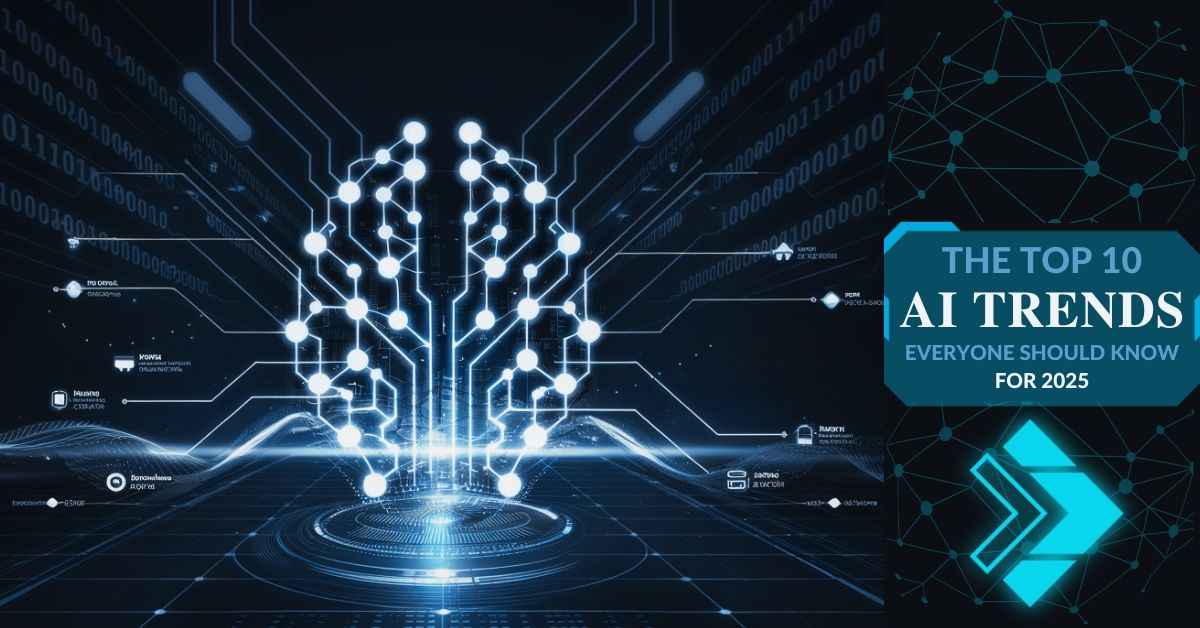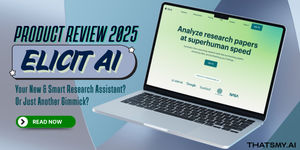In 2025, AI will be a bigger part of our lives, from helping us work better to improving cybersecurity. Key trends include responsible AI to keep things fair, making video content with AI, smarter voice assistants, and new rules to regulate AI use. We will also see big steps in quantum AI and efforts to make AI more sustainable, reflecting the growth of the technology and the challenges we must face.

Are you ready for a future powered by Artificial Intelligence (AI)? The year 2025 is set to bring incredible transformations, with AI changing the way we work, live, and interact with the world around us.
AI is becoming more deeply embedded in every aspect of our lives. From our jobs and homes to the broader community, AI's influence is growing rapidly. This technology is revolutionizing industries, changing how we communicate, and even altering our perspective on the world.
In this article, we will explore the ten major AI trends that are expected to define 2025. These trends will create new opportunities while also presenting challenges, making it essential for us to stay informed and prepared for the exciting journey ahead.
AI is not just about doing tasks automatically; it’s also about helping people be better at their jobs. In 2025, AI will be used in more helpful ways to make people more productive and creative. This will allow humans and machines to share work in a smarter way.
AI will handle boring and repetitive tasks like data entry and scheduling.
Workers will focus on creative problem-solving and tasks that need a human touch.
AI tools will help people work better together by analyzing data and offering useful advice.
Jobs will be more interesting and less boring, leading to happier workers.
Using AI for real-time decisions is becoming very important for businesses to stay ahead. In 2025, AI will take over more tasks, letting companies respond faster to market changes and customer needs.
AI will make quick decisions in areas like inventory management and marketing.
Businesses will be able to target customers based on what they do in real time.
This will make things run more smoothly, save money, and make services better for customers.
Companies that use AI will be able to keep up better with changes and trends.
AI is getting more powerful, but that also means there are ethical issues to think about. In 2025, there will be a bigger push to make sure AI is used fairly and responsibly.
Companies will need to make sure AI can be checked and explain how decisions are made.
There will be more effort to remove bias from AI to make it fairer for everyone.
New laws will push for ethical AI use, and companies that ignore this could face problems.
Education will help developers and users understand how to use AI in the right way.
Generative video technology will change how videos are made, making it easier for everyone to create content. In 2025, making videos will be faster and cheaper thanks to AI.
People can type a script and turn it into a video instantly, much like how ChatGPT creates text.
Small businesses and content creators will be able to make good videos without spending too much money.
Teachers can use generative video to make lessons more fun and interactive.
It will also let people create their own social media videos more easily.
Voice assistants like Siri and Alexa are getting much smarter. In 2025, they will be able to hold better conversations and be more helpful in everyday tasks.
Voice assistants will sound more like humans, making conversations smoother.
Advanced assistants will help with more complex tasks like making bookings or organizing schedules.
Voice assistants will be in more than just phones; they will be in home devices, cars, and other gadgets.
They will become like real personal helpers, making daily life more convenient.
As AI becomes more common, governments will create new rules to make sure it's used safely and ethically. In 2025, new laws will help protect people from AI's potential problems.
Regulations will focus on stopping harmful uses like deepfakes and unfair AI practices.
Developers will be required to explain how their AI systems make decisions.
Businesses will need to follow these rules to avoid fines and earn customer trust.
These regulations will try to keep innovation going while making sure AI is safe for everyone.
In 2025, we will see more autonomous AI agents that can handle different tasks without needing a lot of help. These agents will be helpful, but they also come with safety concerns.
AI agents will be able to handle tasks like customer service on their own.
They will adjust their actions based on what happens, making them more flexible.
Proper monitoring will be important to prevent these agents from making mistakes.
Rules and safety checks will be needed to make sure these AI agents are used responsibly.
AI-created fake content will continue to be a big issue in 2025. Society will need new ways to deal with misinformation and make sure people get accurate information.
Governments will make stricter rules to fight against AI-created fake news.
Schools and organizations will teach people how to spot false information.
AI tools will help detect fake content and restore trust in what we see online.
People will need better critical thinking skills to know what information is real.
Quantum computing is a new kind of technology that could change what AI can do. In 2025, quantum AI will start to solve problems that regular computers can’t handle.
Quantum AI could make big breakthroughs in healthcare, like finding new medicines faster.
It will also help solve problems in supply chains, logistics, and climate modeling.
Even though it's still early, quantum AI will generate excitement in 2025 as progress is made.
More investments will go into quantum AI as it becomes clearer how it can be used.
AI will be very important in keeping us safe from cyber threats. As attacks become more advanced, AI will help defend against them in 2025.
AI will keep watch over networks, catching threats before they cause problems.
Chatbots powered by AI will teach people how to avoid phishing scams and other risks.
Governments and companies will invest more in AI to protect important systems and data.
AI will also help people understand cybersecurity better and practice safer habits.
In 2025, we need to think more about how AI affects the environment. Efforts will focus on making AI greener and using it to help other sectors be more sustainable.
Data centers will switch to renewable energy to lower AI's carbon footprint.
AI will help farmers use water and fertilizers more efficiently, reducing pollution.
Cities will use AI to manage traffic better, cutting down on emissions and improving air quality.
Developers will work to make AI more energy-efficient, so it becomes more eco-friendly.
The year 2025 will be a turning point for AI, as it becomes an even bigger part of our daily lives. From making us more productive at work to solving complex problems with quantum computing, AI will push the limits of what we thought was possible. While AI gives us great chances to improve, it also means we need to be careful and responsible to make sure everyone benefits and risks are minimized. By understanding these trends and getting ready for them, people, businesses, and governments can use AI to build a future that is innovative, fair, and sustainable.
Sign up to gain AI-driven insights and tools that set you apart from the crowd. Become the leader you’re meant to be.
Start My AI Journey
ThatsMyAI
20 March 2025

ThatsMyAI
7 March 2025